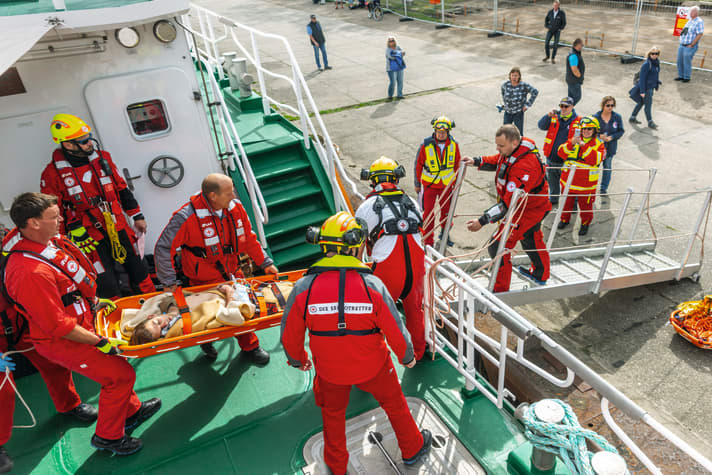
Jörg Weiland is caught in the morning on his way into the cockpit during a ferry trip between Corsica and the Balearic Islands. He is just about to take over the watch when a choppy sea throws the yacht from starboard to port - and him against the edge of the refrigerator. A vertebrae fracture!
"I couldn't move because of the pain," says Weiland. His crew colleagues had to organise help. The sea rescuers first diverted the yacht to Menorca. There, everything is already prepared for rapid treatment at the local hospital. The international travel health insurance takes care of this and also pays for it. However, it would not have reimbursed his return flight to Germany in this case, says Weiland.
However, because the sailor is also an ADAC-plus member, he is flown out to Bremen a few days later by the automobile club's air rescue service. From there, he was taken by ambulance to Hanover Medical School. Shortly afterwards, he is operated on. The man in his late seventies is now sailing again: "I'm fine again," he reports.
Similar cases do not always end so lightly. Especially because many sailors are not properly insured when in doubt. No wonder, given all the different types of travel insurance and travel insurance policies on the market. Answers to the most important questions.

What exactly are the differences between the various travel insurance policies?
Travel health insurance provides cover if you fall ill or require treatment while travelling abroad. Under certain conditions, it also covers repatriation. The policies are inexpensive. If you are travelling several times a year, annual policies are better, but the individual stays abroad can usually only last 42 days.
If you have to cancel a trip due to illness, for example, travel cancellation insurance will cover the cancellation costs. Stiftung Warentest recommends combining this with trip cancellation insurance. This pays out in certain cases if you have to interrupt, cancel or unplanned extend a trip. However, the product testers advise against package offers in this context, as the quality of the individual insurance policies can vary greatly.
There are special variants of travel or charter cancellation insurance for sailors. In particular, they take into account the fact that a trip often cannot take place even if only one crew member, in the worst case the skipper, cancels and there is no replacement. If a single crew member cancels but the trip goes ahead, the insurance will cover their share of the travel costs. When taking out insurance, you should always pay attention to the amount of the excess.
What does the statutory health insurance fund pay for treatment within Europe?
In principle, statutory health insurance covers the costs of outpatient and inpatient treatment in EU countries and in countries with which a social security agreement exists. However, with the "European Health Insurance Card" you are only entitled to treatment according to the national standard. This is not always what you are used to in Germany. And if you are sent to a private doctor or admitted to a private clinic, you may not receive any treatment at all. In addition, patients with statutory health insurance may have to pay a high co-payment. However, costs that exceed the health insurance rates of the country you are travelling to are not covered. This is why international health insurance is important. What's more, statutory health insurance never pays for return transport to Germany, nor does it cover treatment outside Europe.
What do I need to look out for in the clauses relating to repatriation?
Tariffs that only cover "medically necessary" repatriation are generally not recommended. This means that you will only be repatriated if, for example, a necessary operation cannot be carried out in your holiday destination because the medical equipment is not available. However, this is rarely the case. Contracts that provide for repatriation are better if it is "medically advisable". In this case, it is sufficient if, for example, the patient does not understand the local language, cannot reasonably be expected to spend a longer period of time in the local hospital or can recover more quickly in their familiar surroundings at home.
What applies to privately insured persons?
Before travelling, you should ask your insurance company what costs will be covered. Health insurance cover outside Europe is usually limited to one to three months. And not all policies include repatriation. For privately insured persons with a basic tariff, cover is only valid for trips within Europe and does not include repatriation.
Some credit cards also include foreign health or travel cancellation insurance. However, the protection is often incomplete, says Stiftung Warentest.
What is included in travel cancellation insurance?
The events for which an insurer pays out are specified in the small print. In addition to serious illness, accident and death of relatives, the insured reasons often include complications during pregnancy, loss or change of job and damage to property such as a fire in your own home. The insurance usually also covers "risk persons", i.e. close relatives or fellow travellers. However, you should make sure that the whole crew is insured. You usually have to take out travel cancellation insurance no later than 30 days before the start of the trip, sometimes no later than 14 days after booking the trip. International health insurance, on the other hand, can be taken out up to one day before departure.
According to the ADAC, an ambulance flight from Mallorca costs 24,000 euros, a rescue by helicopter up to 16,000 euros - per hour!
Who pays if I have to be flown out or rescued by helicopter?
An intensive care transport with an ADAC ambulance plane from Mallorca to Germany costs 24,000 euros. In 2021 alone, ADAC had 5,400 return transports. Helicopter missions are also expensive. According to insurance provider Yacht-Pool, they cost up to 16,000 euros - per hour! Therefore, make sure that your international travel health insurance also pays out if such flights are medically advisable or if there is no accident in the event of an accident because all persons could be rescued unharmed.
You should also check how much the insurance company will pay for recovery costs - some pay a maximum of 10,000 euros. If the rescue is the result of an accident, accident insurance may also pay, if available. If you want to make a claim on your insurance for repatriation, the following applies: always check with the insurer first, otherwise they may not pay.
Are coronavirus risks insurable?
A positive corona test during the cruise alone does not constitute grounds for a claim for repatriation. An official travel warning due to Covid-19 is not sufficient for travel cancellation or curtailment insurance to apply. It certainly does not pay if a trip is only cancelled out of fear of a Covid-19 infection.
The situation is different when countries close their borders to tourists. At the beginning of the coronavirus crisis, many insurance companies still excluded the risk of a pandemic. This has changed. As a rule, travel cancellation insurance also pays for the cancellation of the entire charter if the skipper falls ill with coronavirus, and proportionately for crew members. However, if the skipper has to go into quarantine, this is not yet an illness in the sense of the insurance - it does not have to pay for the consequences. This risk can now also be covered by Hamburger Yacht-Versicherung: The insurance also pays if the crew is quarantined abroad or turned away at the airport.
What does ADAC membership cover?
If you are a member of the automobile club, you can benefit from this as a sailor. However, basic membership (from 54 euros) does not cover medically appropriate repatriation, an unscheduled journey home or the repatriation of underage children if you are ill or injured. All this is only available with Plus membership (from 94 euros). This also pays for an interpreter or sick visits by relatives. However, worldwide international health cover with private patient status is only available as a Premium member (from 139 euros).
The boat should also be properly insured. You can find out everything you need to know about this in this special:

